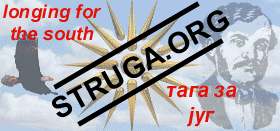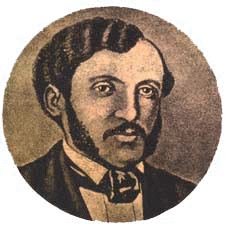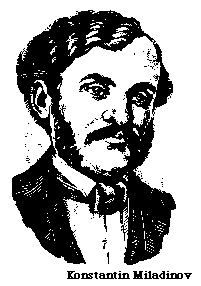
 |
Konstantin Miladinov (1830-1862) |
The authors of the first historically valuable verses written in the Macedonian language are Kiril Pejchinovic and Yordan Hadzi Konstantinov - Dzinot. Nevertheless, Konstantin Miladinov is considered to have been the founder of the Macedonian artistic poetry, because his verses besides historical have an artistic value as well.
Konstantin Miladinov was born in Struga in 1830. He was educated in his native town and in Janina, and graduated in philology in Athens. He worked as a teacher for a short period and then left for Russia where he began with his university studies in 1857. While in Russia he helped his older brothers Dimitar and Naum in editing the materials for the "Zbornik na narodni umotvorenija - The Collection of Folk Songs, Riddles and Costumes" that have been collected by Dimitar and Naum during their field work in Macedonia. The collection was subsequently published in Croatia with the support of the bishop Josip Juraj Shtrosmaer from Croatia who was one of the patrons of Slavonic literature at that time.

|
Because of the cold climate in Moscow Konstantin Miladinov left Russia after a few years spent there. On his return from Moscow, after arriving in Belgrade, he found out that his brother Dimitar had been imprisoned in Istanbul (Carigrad). He immediately went there, but he was reached by the same destiny as his brother. Even though Shtrosmaer did eveything in his power to help them, they both died in the Istanbul prison, first Konstantin and then two days later his brother Dimitar Miladinov.
He wrote only 15 songs among which "Bisera", "T'ga za Jug", "Zhelanie", "Golapche", and others. "Bisera", one of his most beautiful love songs, is written in the spirit of the folk poetry. Konstantin Miladinov's most emotional and beatiful song is considered to be "T'ga za jug - Longing for the south", written while he was staying in Russia. At that time he already felt ill, dissappointed and obsessed by the desire to go back to his native country. Konstantin Miladinov succeeded to create poetry that is original in spirit and form. Hence, many anthologies of the Macedonian literature begin with his verses. His poetry, in particular the song "T'ga za jug" has been translated in many language.
Every year in the honour of the Miladinov brothers one of the biggest poetry festivals in the world takes place in their home town. The Struga Poetry Evenings are held for one week at the end of August with participation of many poets from all around the world.
If I had an eagle's wings I would rise and fly on them To our shores, to our own parts, To See Stambol, to See Kukuš; And to watch the sunrise: is it Dim there too, as it is here? If the sun still rises dimly, If it meets me there as here, I'll prepare for further travels, I shall flee to other shores Where the sunrise, greets me brightly, And the sky is sewn with the stars. It is dark here, dark surrounds me, Dark for covers all the earth, Here are frost and snow and ashes, Blizzards and harsh winds abound, Fogs all around, the earth is ice, And in the breast are cold, dark thoughts. No, I cannot stay here, no; I cannot upon this frosts. Give me wings and I will don them; I will fly to our own shores, Go once more to our own places, Go to Ohrid and to Struga. There the sunrise warms the soul, The sun gets bright in mountain woods: Younder gifts in great profusion Richly spread by nature's power. See the clear lake stretching white- Or bluely darkened by the wind, Look you at the plains or mountains: Beauty' everywhere divine. To pipe there to my heart's content! Ah! let the sun set, let me die. | Eagle's wings were I to drape, and to our side upon them escape! To our places I would travel, revel at Struga, at Kukus I'd revel: to see if the sun also there bleakly rises, as it does here. If again the sun should meet me, if again bleakly it's shine greets me; on a path distant I'll commit to labour, and in different places I'll take cover, where the sun bright is rising, where the heaven stars is sowing. Here it's dark, in darkness I'm dressed, and in dark mist the earth is oppressed: ice and snow, and cinders, strong winds, and gales; cloaked in destiny's mist and frost, a chill in breast, and most dark thoughts. No, I cannot here just stay: no, I cannot face ice-grey: give to me wings that I can drape, and to our side upon them escape, To our places I would travel, revel at Oxrid, at Struga I'd revel. There dawn warms the soul; there faith - with natural vigor gifts had spread with majestic splendor: serene lake turns crystal-clear, and the breeze disturbs this clear; see the field or mountain-range, everywhere God's beauty gauge. There by heart the flute I'd play sun may set, in peace I die. (Alternative translation by Toni Momiroski) |
 |
Konstantin Miladinov (Struga, 1830 - Carigrad (Istanbul), 1862)
is the first macedonian lyrical poet. In his early ages he left to study
in Moscow, which, in that time, was an important cultural center for the
slavic world. In the Moscow university Miladinov studied philology.
In the time of his stay in Russia he was feeling deep sorrow and loneliness because of his being far away from his own country. On his way back from Moscow, Konstantin heard that the Ottoman police has arrested his brother Dimitar Miladinov and, hoping that he would be able to free his brother, he changed his route and went to Carigrad (istanbul). But the Ottoman police arrested Konstantin too, and the two brothers died one after the other in the Carigrad prison in 1862. Konstantin and Dimitar Miladinov had a major role in the waking of the macedonian people and their nationality. With their teaching activities and the collecting of the macedonian folk literary works, they set the grounds for the modern macedonian literature. |
Orelski krilja kak da si metneh, i v nashi strni da si preletneh na nashi mesta ja da si idam, da vidam Stambol, Kukush da vidam, da vidam dali s'nce i tamo mrachno ugrevjat kako i vamo. Ako kak ovde s'nce me sretit; ako pak mrachno s'nceto svetit, na p't dalechni ja kje se stegnam, i v drugi str'ni kje si pobegnam, k'de s'nceto svetlo ugrevjat, k'de neboto dzvezdi posevjat. Ovde je mrachno i mrak m'obviva i temna m'gla zemja pokriva, mrazoj i snegoj, i pepelnici, silni vetrishcha i vijulici, okolu m'gli i mrazoj zemni, a v gr'di studoj, i misli temni. Ne, ja ne mozham ovde da sedam, ne, ja ne mozham mrazoj da gledam! Dajte mi krilja ja da si metnam i v nashi str'ni da si preletnam; na nashi mesta ja da si idam, da vidam Ohrid, Struga da vidam. Tamo zorata greit dushata, i sn'ce svetlo zajdvit v gorata; tamo darbite prirodna sila so s'ta raskosh gi rasturila: bistro ezero gledash beleit, i si od vetar sino temneit: pole poglednish, ili planina, segde bozheva je hubavina. Tamo po srce v kaval da sviram, s'nce da zajdvit, ja da umiram. |